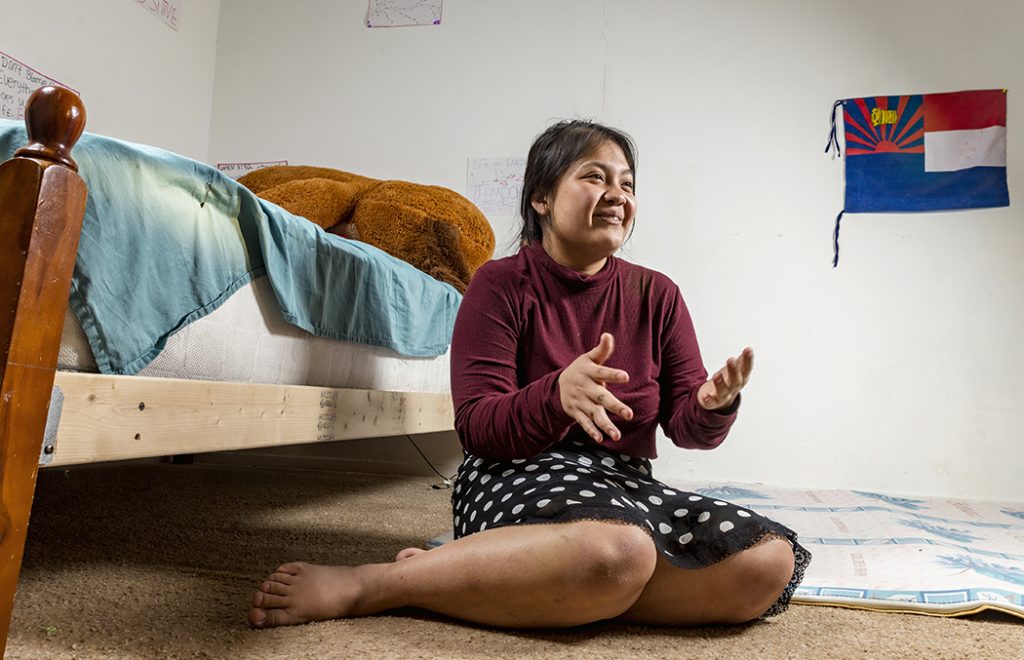Meet the second of five Lake Highlands High School students to appear in our May 2017 issue about graduating seniors who, despite facing incredible obstacles are (to quote Lin-Manuel Miranda‘s Hamilton), young, scrappy and hungry.
A wise elderly grandmother’s soul seemingly is trapped inside Moo Hser’s teenage body. Maybe it is the way that she walks a departing visitor to her car, hugs her, then stands, smiling, waving, otherwise unmoving, fading as her guest exits the lot of the apartment complex, where Moo lives among a population of mostly refugees from the Myanmar region. Perhaps it is her attitude; she perpetually smiles, jokes, doles out specific compliments to everyone she sees and repeats, “It’s OK” after describing a terrible personal experience.
As soon as she introduces herself, Moo hands over three sheets of type-filled paper. “It’s my story, because my accent is bad and you might not understand me,” she says.
Growing up in a refugee camp in Thailand made Moo lose faith in the world, she writes. “Me and my family were starving, crying out for hope, freedom, food. Every night I heard my mother cry, crying herself to sleep, and I witnessed her trying to commit suicide.”
The first time, Moo saw her mother attempt to hang herself with a sheet, she says. Another time, she ingested rat poison. When Moo was 8, sharing her mother’s despondency, she swallowed a handful of all the pills and medicines she could get her hand on.
Moo’s parents had been through so much — Moo remembers the carnage of 2001, she writes, though she was just 3. “Blood everywhere. People young and old hit the ground. Babies die in parents’ arms from bullets and bombs. My mom carried my baby brother and my dad carried me in his left arm, with my older brother in his right while our oldest brother ran like a cheetah. I remember my parents’ faces, worried about us, not themselves. I remember I looked back and saw women being tied up and men being shot right in front of their families.”
Moo’s family would live to see better days, but not for nearly a decade. Though they escaped the bloodbath in the forests along the Burma-Thailand border, they continued to fight for survival throughout nine years in the massive Mae La camp, sustaining on bamboo, flowers and bugs they found in nearby mountains. Shelter was constructed from wood, bamboo and leaves, making the risk of fires extreme. The Karen Women’s Organization revealed numerous cases of violence against women at the camp in 2011-13 (after Moo and her family moved, though earlier reports had prompted the research) and showed that victims found little justice. Living among some 40,000 other refugees, all of them hoping for resettlement, possibilities looked bleak. So when Moo’s family immigrated to America in 2007, she says, it was as if she had relocated to paradise. “I saw these lights of the city. I saw this streetlight. Glowing poles and markers along the roads. It was so shiny, so beautiful. I knew everything I dreamed was true — it was Heaven.”
Her elation was short-lived. The bullying began when she arrived at Hotchkiss Elementary School.
“I was lost,” she says. “I did not know where to go. I did not know how to speak English. I was picked on from the first day. They made fun of my name. Moo means ‘life’ in my country, but that’s not what it means here. And worst of all no one was there to help me get through it all.” She recalls a boy with a bloody injury telling a teacher that she had hit him. Horrified at both the blood and the subsequent false accusation, she had no words to defend herself. Today Moo understands, “The people making fun of you, the meanest ones, are the ones going through the most hard times.” Pain, caused by weapons or words, can be temporary, Moo says. “God has a dream for us. That is what is real and permanent.”
Friend Blen Hussain says Moo “defies my understanding.” Despite everything, she is always laughing, smiling and hugging everyone, even strangers. “She will hug you,” Blen advises. (True.)
As a child swallowing pills, believing death the only way out, Moo could never have imagined attending a large urban high school, graduating and attending college. But, thanks to teachers including Matthew Morris and Alissa Long she is destined for university life. “My teachers here, in AVID and every one of them, have changed my world in a good way.”
Moo will double major in theology and business, she says. She declines (with a big, mischievous smile) to say on record what she aims to do with the degrees.
“I know, but I want to keep it a secret.”
If you can’t wait to read about the other students we featured, the whole story is here.






